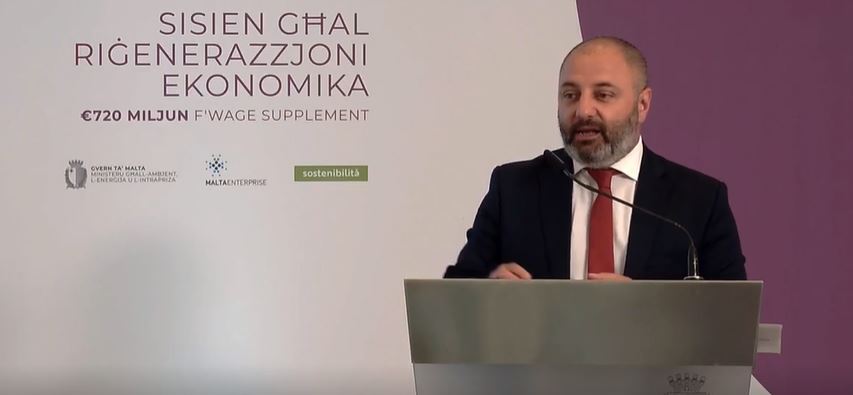The Government’s COVID wage supplement scheme, operated by Malta Enterprise, will be extended for another month to cover May, Malta Enterprise CEO Kurt Farrugia officially confirmed on Thursday.
He described the scheme as “the largest economic support measure in Malta’s history”, touting the efficiency with which it was rolled out.
Minister for Enterprise Miriam Dalli credited the programme with preventing the collapse of the Maltese economy, and thanked social and economic partners for working side-by-side with Government.
“We were able to support 120,000 jobs, and over 17,000 businesses, with around 60 per cent of private sector workers benefitting from the scheme,” she said.
This came at a cost of around €720 million, an expense the Minister described as an investment in Malta’s future. “Our country is not only on the way to recovery, but is looking beyond, with the lowest rate of unemployment in Europe.”
She went on to describe the potential impact on Malta as “devastating”, explaining that the cost of inaction would have been far higher.
The extension was first revealed by BusinessNow.mt earlier this week and comes just before the scheme was set to expire.
It is the most widespread and expensive form of Government assistance to businesses introduced during the COVID pandemic, and was initially thought to be expiring at the end of April as Malta’s economy makes progress down its road to recovery.
The supplement sees the Government pay a part of the salaries owed to companies’ employees, and has been widely hailed as a lifesaver for many businesses, and an essential pillar of Malta’s economy during the economic downturn experienced as a result of the pandemic.
The wage supplement is disbursed based on a tapering system, with worst-hit companies in terms of revenue receiving the full €800 monthly supplement per employee.
The scheme has been repeatedly extended, and in January Prime Minister Robert Abela promised Malta’s business community that the COVID wage supplement will remain in place “for as long as is necessary,” while also warning against dependence on the scheme.
It has been especially useful for the hospitality and catering sectors which have been particularly hard hit by both pandemic restrictions and the sudden precipitous drop in tourism figures to the island.
Rising costs in the form of a squeezed labour market and widespread inflation will also likely mean that businesses will welcome the extension of the supplement for another month.
On the other hand, it also comes despite concerns about Malta’s soaring deficit, which hit €1.24 billion by the end of 2021 – around 8.5 per cent of the country’s overall annual gross domestic product (GDP).
More to follow.
Two years since its birth, Moneybase features on Microsoft’s Customer Stories
Moneybase has now just been featured on Microsoft’s latest Customer Stories
Finance Minister confirms continuity of food and energy subsidies
Spending on food and energy subsidies as a percentage of the GDP will be at 0.7% in 2025
MHRA congratulates Glenn Micallef on EU role, highlights positive impact on Malta’s tourism and cultural sectors
The lobby group emphasised that Malta’s cultural assets and sports scene are key factors in attracting visitors and fostering economic ...






